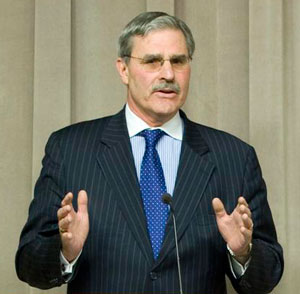 GOPAC’S ANTI-MONEY LAUNDERING GLOBAL TASK FORCE
GOPAC’S ANTI-MONEY LAUNDERING GLOBAL TASK FORCE
Governments in banking centres like Switzerland and Liechtenstein have said that they will ease strict banking secrecy rules and will exchange information with foreign governments to combat tax fraud and tax evasion. While this is a positive development, it does not address the need to stop the laundering of corrupt money, and the recovery and repatriation of stolen assets.
Pressure is mounting on offshore banking centres, tax havens and international financial institutions, from a variety of sources, to stem the growing problem of money laundering. After September 11, 2001, a focus on the detection and prevention of money laundered to finance terrorist activities followed swiftly, and resulted in the release of nine new terrorist financing standards by the Financial Action Task Force (FATF).
OECD countries have been increasingly pushing for greater cooperation from tax havens to curtail the growing incidence of tax fraud and tax evasion.
The scourge of international drug trafficking has encouraged international financial institutions to be more forthcoming in the detection, tracing and recovery of laundered drug money.
The formation by the World Bank and the United Nations Office of Drugs & Crime (UNODC) of the Stolen Asset Recovery (StAR) initiative is already producing results in successfully locating and repatriating stolen corrupt assets.
All of these developments have underlined the importance for banks to ‘know their customers’, and the need for detailed scrutiny and due diligence.
Transparency International is becoming more proactive in identifying the laundering of corrupt money as a significant problem in need of attention.
The laundering of corrupt money, however, has so far not received the same attention that has been afforded terrorist financing, tax evasion and drug trafficking. Corruption, however, has an equally devastating negative impact on citizens. Effective anti-money laundering regimes can reduce the incidence of corruption.
GOPAC is focused on creating the political will to combat the laundering of corrupt money and the recovery of stolen corrupt assets. GOPAC works with institutions like the World Bank, the International Monetary Fund and others to reach parliamentarians and governments around the world and encourage the implementation of sound anti-money laundering policies and programs. GOPAC has delivered a number of anti-money laundering workshops and conferences and has begun a dialogue with the offshore banking community. GOPAC is proposing to co-host a series of meetings with jurisdictions hosting offshore banking and international financial institutions to ‘push the envelope’ on the policies, legislation and procedures needed to prevent or minimize the laundering of corrupt money, and facilitate the recovery of stolen assets.